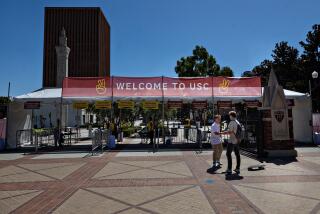Lawmaker Urges Rules on Used-Car Donations
- Share via
Donating used vehicles to charities has become popular among private donors looking to do good while unloading an old car--and at the same time receive a tax credit--and philanthropic organizations needing to fill their coffers.
But state Sen. Patrick Johnston (D-Stockton) has found that too many charities operating in California are lending their good names to used-car dealers and professional fund-raisers who agree to give them a minuscule cut in return for selling the donated used cars. He characterized the practice as “auto donation hypocrisy.”
His SB 1836, which cleared the Senate last week and will soon be considered by the Assembly, would require charities that already estimate for donors what percentage they take in on non-cash donations to also issue receipts evaluating the amount ultimately collected from the sale of a donated vehicle.
The measure also addresses a second problem he sees arising from the growing number of car donations: the donor’s tendency to overestimate the value of the gift and thus claim too high a tax deduction.
The bill would require detailed receipts describing the model, year and condition of the car.
Some charities say the aid that comes after a donated car is sold--whatever the amount--is a windfall. But Johnston says organizations routinely receive no more than 20% of the value of cars donated, with some getting as little as 5% or 6% after professional fund-raisers deduct their expenses.
According to state records, in 1996--the last year for which figures are available--such professional fund-raisers earned $11.1 million from the sale of donated vehicles, but only turned over $2.1 million to charities.
Luis Barthel, general manager of ONNE Corp. in Los Angeles, which collects and resells 7,000 cars annually for such organizations as AIDS Project Los Angeles, says his firm takes 70% of gross revenue for expenses, then divides the remaining profit, with 60% going to the charity, 40% to his company.
“The AIDS Project received close to a half million dollars [since October 1996] without the least amount of risk and not spending a dime,” Barthel said. That money, he added, “has been greatly appreciated and needed.”
More to Read
Sign up for Essential California
The most important California stories and recommendations in your inbox every morning.
You may occasionally receive promotional content from the Los Angeles Times.













